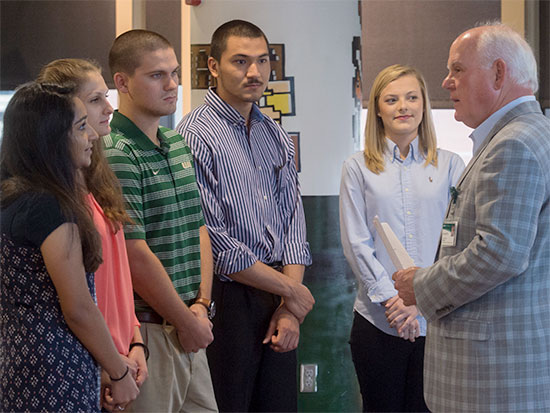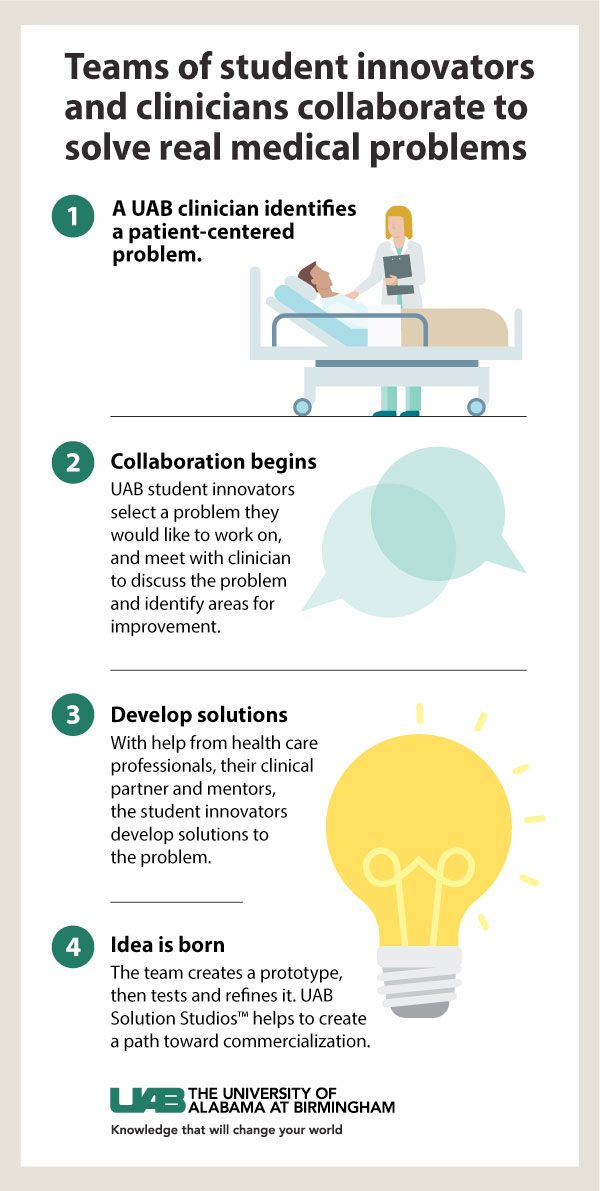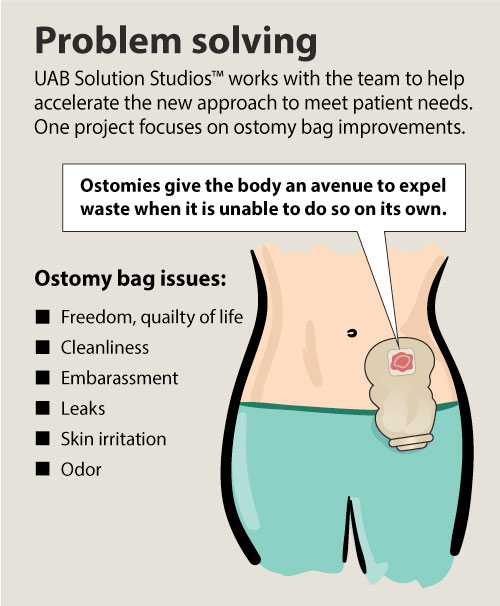 Recipients of the UAB Presidential Innovation Summer Fellowship program were recognized for their commitment to clinical innovation by UAB President Ray L. Watts at a May reception.Five University of Alabama at Birmingham undergraduate students are a part of an interdisciplinary team working with graduate nursing students and clinicians toward translating ideas into improved patient care and outcomes.
Recipients of the UAB Presidential Innovation Summer Fellowship program were recognized for their commitment to clinical innovation by UAB President Ray L. Watts at a May reception.Five University of Alabama at Birmingham undergraduate students are a part of an interdisciplinary team working with graduate nursing students and clinicians toward translating ideas into improved patient care and outcomes.
Nurses and clinicians have chosen to devote their lives to patient care, during which they sometimes come across processes or products that could be improved. While they have little time to give to moving a solution to the problem forward, their experience with patients on a daily basis makes them adept at identifying opportunities for improvement.
That is where the teams of innovators from UAB’s Solution Studios™ come in.
The purpose of UAB Solution Studios™ is to accelerate the translation of clinical innovation by training clinicians and STEM students — those studying science, technology, engineering and math — to collaborate and think creatively around solutions to clinical problems.
Solution Studios™ is a partnership among the UAB Honors College Science and Technology Honors Program, UAB Medicine and the UAB schools of Engineering and Nursing.
 Five students who participated in the program were honored May 30 as the recipients of the UAB Presidential Innovation Summer Fellowship program. The recipients of the summer fellowship are Brody DeSilva, Allaire Doussan, Ali El-Husari, Hira Munir and Paige Severino — all Science and Technology Honors Program students in the UAB Honors College. The fellowship program will allow them to continue the work they started in UAB Solution Studios™.
Five students who participated in the program were honored May 30 as the recipients of the UAB Presidential Innovation Summer Fellowship program. The recipients of the summer fellowship are Brody DeSilva, Allaire Doussan, Ali El-Husari, Hira Munir and Paige Severino — all Science and Technology Honors Program students in the UAB Honors College. The fellowship program will allow them to continue the work they started in UAB Solution Studios™.
The fellowship program is supported by UAB President Ray L. Watts.
“Collaborations like this make UAB a great place, and this one gives us a special opportunity,” Watts said. “The ability to think as biomedical engineers do with real clinical problems is a very creative and very unique situation. As soon as I heard about UAB Solution Studios™, I wanted to make sure we were doing everything possible to support these students and clinicians.”
The students will work in two teams, along with their clinical partners and a local industrial design firm, to address patient-centered problems identified by the clinician. One of the teams will work to create an improved mechanism for attaching wires to a patient.
The second team will work to improve ostomy bags, which are medical devices that give the body an avenue to expel waste when it is unable to do so on its own. According to clinician partner Tracie White, who works as an instructor in the School of Nursing and in UAB's Division of Gastrointestinal Surgery, there are some critical issues with the current standard of care when it comes to ostomy bags.
“Many patients have a disease process that results in either a temporary or permanent ostomy,” White said. “These patients have already had a tough time, medically speaking, and now they have to live with a pretty unpleasant device attached to them.”
White heard about the UAB Solution Studios™ concept, and felt compelled to raise ostomy bags as a potential idea for which innovation could play a big role in improving the quality of patient care.
As part of the UAB Solution Studios™ process, the clinician creates a PowerPoint or makes a video explaining the problem. Then students log on to the site and select a problem they would like to address.
For teammates El-Husari and Severino, the ostomy bag issue was one they desired to tackle.
 “For me, when I learned about ostomy bags and the potential problems they present to patients, I knew it was something I wanted to help solve,” Severino said. “The bag may cause patients embarrassment, and I was drawn toward helping them.
“For me, when I learned about ostomy bags and the potential problems they present to patients, I knew it was something I wanted to help solve,” Severino said. “The bag may cause patients embarrassment, and I was drawn toward helping them.
“It’s going to truly be a great experience to get in an actual clinical setting as an undergraduate student,” Severino said. “I don’t know of any other university that gets its students such innovative opportunities so early on in their careers. UAB is doing that for us, and I couldn’t be more excited for this process.”
To create a culture of fostering clinical idea generation and testing in academic medical centers, UAB Solution Studios™ implemented structured design thinking into the training of health professionals at UAB. Design thinking is a defined, creative, problem-solving approach that taps into the health professional’s sensibility, coupled with an established practical methodology to meet patient needs through innovations in clinical approaches.
Fundamental to the design thinking strategy is the premise that the successful creation and translation of innovative ideas relies on the ability to empathize with others to understand problems from another’s point of view. From this basis of empathy, potential solutions are realized, quickly prototyped and tested with minimal costs, and then refined through iteration.
The students will work through these steps as part of the Presidential Innovation Summer Fellowship program, with a program to culminate the fellowships on Aug. 22.